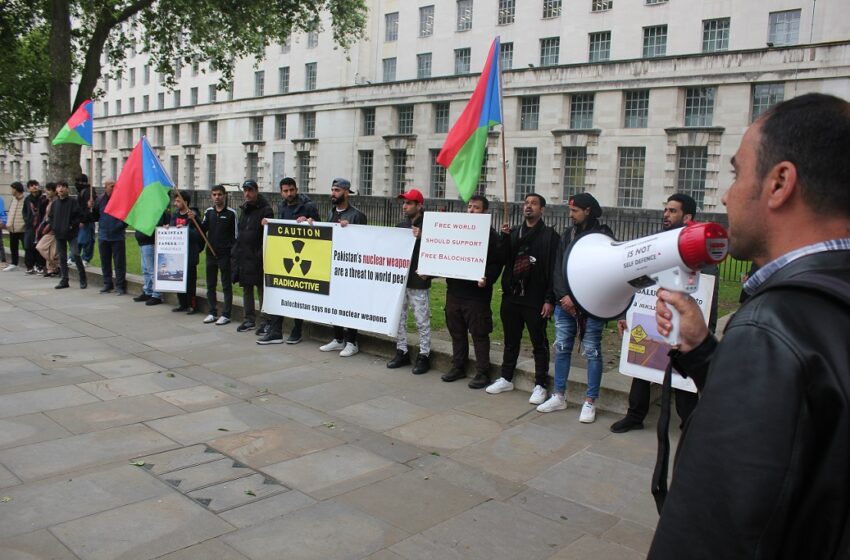Indian State Should Focus on Unconventional Methods: Jamal Nasir Baloch
Balochistan: Pakistan’s Nuclear Tests Continue to Cause Unimaginable Sufferings

LONDON – On Tuesday, May 28, the Free Balochistan Movement’s United Kingdom and Netherlands branches held protests against Pakistan’s nuclear tests conducted in Balochistan’s Chaghai region on May 28, 1998.
In a statement to the media, the Free Balochistan Movement highlighted the severe health impacts caused by nuclear radiation and waste. These include increased cases of thyroid cancers, leukemia, cataracts, skin diseases, gynecological conditions, bone marrow diseases, genetic malformations, prenatal deaths, and sterility due to contaminated water, soil, livestock produce, and the environment.
Rasheed Baloch, the organiser of the Free Balochistan Movement’s UK branch, stated that Pakistan tested dirty nuclear bombs in Balochistan’s Koh-e-Kambaraan in Raskoh, Chaghai, on May 28, 1998. He added that Pakistan has not taken any serious precautions, leading to long-lasting detrimental effects on the region. Researchers, journalists, and civil societies have been denied access to document and report on the hazardous impacts of the nuclear fallout.
FBM member in London, Nobat Marri, said that Pakistan has used Balochistan as a testing ground since its occupation in 1948. He added, “In the 1950s, they labeled Baloch resistance as ‘rebellion’ to justify killings of Baloch people. Baloch are a separate nation and Balochistan’s relationship with Pakistan is that of the occupied and the occupier.”
In the Netherlands, outside the International Court of Justice in The Hague, FBM member Shakir Baloch described Pakistan’s nuclear test as a “nuclear attack” on Baloch soil, causing significant harm to the local population. He said that the protest aimed to remind the ICJ of the lives lost and the ongoing suffering due to Pakistan’s actions. He said people in the region noted increased skin diseases among children, cancer deaths among young people and the extinction of various species, including birds, in the region.
Shakir Baloch called on the ICJ, Human Rights Organizations and the UN to address the genocide and human rights violations in Balochistan. He urged a ban on Pakistan’s nuclear program, arguing that it poses a global threat and has never been intended for peaceful purposes.
The FBM statement cited data from the Baloch Doctors Forum, collected from Bolan Medical Complex Hospital, Quetta, Sandeman Provincial Hospital, Quetta, and District Headquarters Civil Hospital and Noshki, covering outpatient and inpatient records from 2000 to 2007. The data revealed a fivefold increase in thyroid diseases, including thyroid cancers, hyperthyroidism, hypothyroidism, and goiter, as well as a threefold increase in dermatological issues, leukemia, bone marrow diseases, cataracts, and ophthalmological diseases in patients from Noshki, Dalbandin, Cheathar, Nokundi, and Kharan.
The findings also indicated a rise in breast cancer and female reproductive system diseases, stillbirths, and prenatal mortality, but no significant increase in lung cancers or congenital malformations.
According to the FBM, an Islamic Relief Pakistan study reported a 57% increase in eye diseases, including cataracts, in Chaghai, Dalbandin, Noshki, Kharan, and Washuk. Nutritional parameters in these areas are worse than national averages, with around 38% of children underweight, 14% suffering from wasting, and 38% from stunting.
The Pakistan Meteorological Department (PMD) reported that districts Chagai, Noshki, Kharan, and Washuk have suffered severe impacts on agriculture and livestock, forcing local populations to migrate. Livestock has faced increased mortality, diseases, weakness, and decreased production and prices. The deficiency in rangeland feed has halved livestock productivity in terms of dairy products (meat and milk).
The Baloch diaspora and members of the Free Balochistan Movement urge the British public, Dutch people and other European nations to pressure their governments to halt all economic, financial, diplomatic, and military support to Pakistan and to demand an end to the crimes against humanity in occupied Balochistan.









